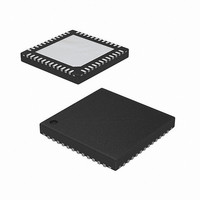ISL6265HRTZ-T Intersil, ISL6265HRTZ-T Datasheet - Page 15

ISL6265HRTZ-T
Manufacturer Part Number
ISL6265HRTZ-T
Description
IC CTLR MULTI-OUTPUT 48-TQFN
Manufacturer
Intersil
Datasheet
1.ISL6265HRTZ.pdf
(24 pages)
Specifications of ISL6265HRTZ-T
Applications
Controller, AMD SVI Capable Mobile
Voltage - Input
5 ~ 24 V
Number Of Outputs
3
Voltage - Output
0.5 ~ 1.55 V
Operating Temperature
-10°C ~ 100°C
Mounting Type
Surface Mount
Package / Case
48-TQFN
Lead Free Status / RoHS Status
Lead free / RoHS Compliant
SVI Bus Protocol
The AMD processor bus protocol is compliant with SMBus
send byte protocol for VID transactions (see Figure 8).
During a send byte transaction, the processor sends the
start sequence followed by the slave address of the VR for
which the VID command applies. The address byte must be
configured according to Table 4. The processor then sends
the write bit. After the write bit, if the ISL6265 receives a
valid address byte, it sends the acknowledge bit. The
processor then sends the PSI-L bit and VID bits during the
data phase. The Serial VID 8-bit data field encoding is
outlined in Table 5. If ISL6265 receives a valid 8-bit code
during the data phase, it sends the acknowledge bit. Finally,
the processor sends the stop sequence. After the ISL6265
has detected the stop, it can then proceed with the VID-on-
the-fly transition.
BITS
BITS
6:4
6:0
3
2
1
0
7
TABLE 5. SERIAL VID 8-BIT DATA FIELD ENCODING
TABLE 4. SVI SEND BYTE ADDRESS DESCRIPTION
PSI_L:
= 0 means the processor is at an optimal load for the
regulator(s) to enter power-savings mode
= 1 means the processor is not at an optimal load for the
regulator(s) to enter power-saving mode
SVID[6:0] as defined in Table 3.
Always 110b
Reserved by AMD for future use
VDD1, if set then the following data byte contains the VID for
VDD1
VDD0, if set then the following data byte contains the VID for
VID0
VDDNB, if set then the following data byte contains the VID
for VIDNB
SVD
SVC
6
DESCRIPTION
DESCRIPTION
15
SLAVE ADDRESS PHASE
5
4
3
2
FIGURE 8. SEND BYTE EXAMPLE
1
0
ISL6265
7
Operation
After the start-up sequence, the ISL6265 begins regulating
the core and Northbridge output voltages to the pre-PWROK
metal VID programmed. The controller monitors SVI
commands to determine when to enter power-savings mode,
implement dynamic VID changes, and shutdown individual
outputs.
The ISL6265 controls the no-load output voltage of core and
Northbridge output to an accuracy of ±0.5% over-the-range
of 0.75V to 1.5V. A fully differential amplifier implements core
voltage sensing for precise voltage control at the
microprocessor die.
Switching Frequency
The R
architecture. The switching frequency increases during the
application of a load to improve transient performance. It
also varies slightly due to changes in input and output
voltage and output current. This variation is normally less
than 10% in continuous conduction mode.
CORE FREQUENCY SELECTION
A resistor connected between the VW and COMP pins of the
Core segment of the ISL6265 adjusts the switching window
and therefore adjusts the switching frequency. The R
resistor that sets up the switching frequency of the converter
operating in CCM can be determined using Equation 3,
where R
Designs for 300kHz switching frequency would result in a
R
In discontinuous conduction mode (DCM) the ISL6265 runs
in period stretching mode.
NORTHBRIDGE FREQUENCY SELECTION
The Northbridge switching frequency to programmed by a
resistor connected from the FSET_NB pin to the GND pin.
The approximate PWM switching frequency is written as
shown in Equation 4:
R
FSET
FSET
F
SW
6
3
value of 6.81kΩ.
(
=
kΩ
modulator scheme is a variable frequency PWM
FSET
5
-----------------------------------
K R
)
DATA PHASE
⋅
=
(SEE TABLE 3)
4
is in kΩ and the switching period is in µs.
FSETNB
(
1
Period μs
SVID
3
(
2
) 0.4
–
1
)
×
0
2.33
May 13, 2009
FSET
FN6599.1
(EQ. 3)
(EQ. 4)











